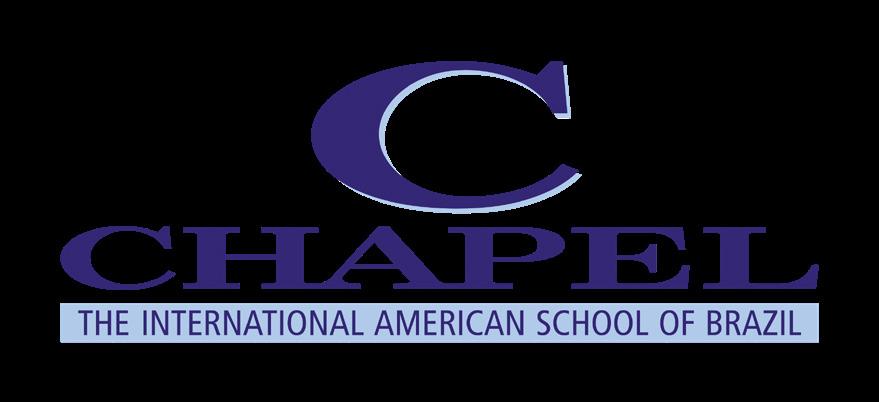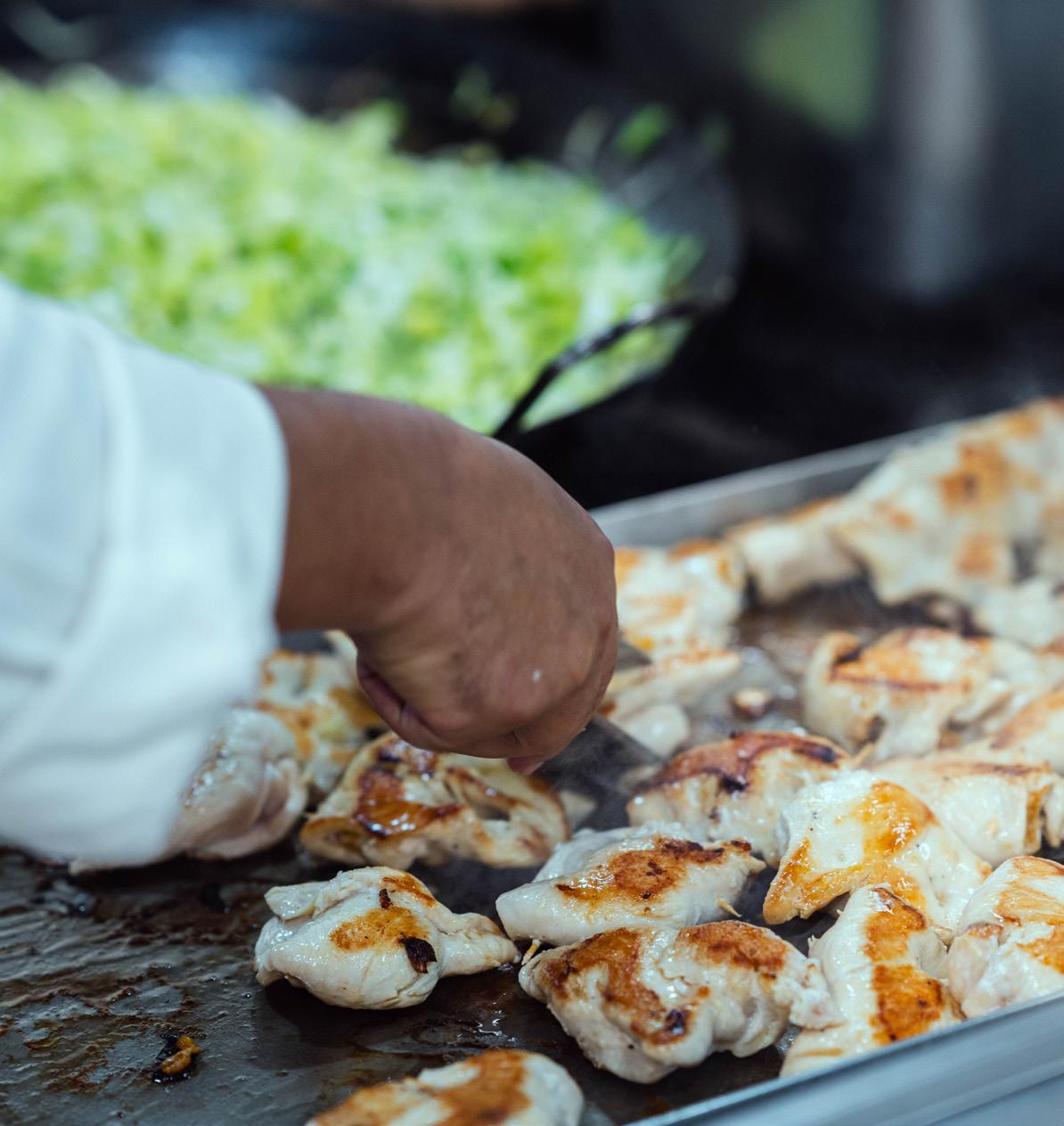







Food Service: Food Safety Above All
Chapel’s Food Service is in charge of preparing snacks and lunch for students, teachers, and other staff members, and provides close to a thousand meals every day under scrupulous sanitation and food safety standards. The menu is carefully prepared to develop healthy student eating habits, while honoring the various cultures that make up the school community, and ensuring good nutrition in all meals.
The team has over 30 professionals, and is coordinated by three permanent nutritionists and one consultant, all responsible for day-to-day food services – morning snack, lunch, and afternoon snack –as well as restricted dietary meals, which are given special attention. The team also oversees the food served during school events, and supplies snacks for the canteen.
The Food Service Department is divided into specific areas, namely: cooking, snacks and restricted diets, salads, desserts, coffee, butcher, pan washing, and washing of trays and smaller utensils. In addition to the main kitchen, there are two support kitchens, one for teachers and one for the Early Childhood Education Course (ECEC). Each has its own utensils, which are not shared, and its own dishwashing and sanitizing machines in their respective areas.
Complying with scrupulous hygiene and cleanliness standards, Chapel’s Food Service takes a series of steps to ensure that service and food safety standards are met. These include employee medical examinations and occasional microbiological food analyses. A contract with a company that specializes in food safety guarantees carrying out frequent random audits to check that employees’ hands, utensils, and equipment are always sanitary. All nutrition team professionals follow strict quality procedures and undergo periodic training. All this care guarantees Chapel’s food safety.
The quality of the raw materials is another factor that ensures the school’s food standards. All suppliers are vetted by the food service department through on-site technical assessments and/or technical sheet, and microbiological analysis before being considered suitable for supply.
Chapel’s kitchen has modern cooking equipment that guarantees healthier preparations while preserving the flavors and textures of the food. A big highlight are the three combined ovens, which use dry hot air and steam to bake, fry, grill and brown foods. Controlled by computers, the oven allows the selection of the cooking point (rare, medium, or well cooked) and the degree of cooking (clear, medium or dark) by adjusting timer, temperature and humidity.

Special diets are addressed according to health forms filled out by families at the time of student enrollment, backed by a medical certificate or report, since Chapel’s food service department does not prescribe diets. Chapel does not add sugar to anything it prepares except lemon or passion fruit juices and the dessert it serves once a week at lunch. In Early Childhood Education, sweets are not served as dessert.
In addition to fulfilling the special dietary needs of students who are diabetic, allergic, or intolerant to certain foods, the Food Service Department provides vegetarian alternatives at every meal, and every day at the campus canteen. Trained professionals are responsible for the special diets, which are cross checked by the Food Service Department team.
Since one of the main goals of the ECEC is to develop independence, meal times are also considered a moment of learning. As such, every ECEC classroom (from Pre I to Kindergarten) has a reserved eating nook where children can eat three meals a day: morning snack, lunch, and afternoon snack. Each nook has its own set of utensils that are sanitized in machines in the ECEC building. At lunchtime, the food is stored in warming carts that are hooked up to power sources on each floor of the building, in order to maintain food temperature and ensure food safety.

The Food Service Department always encourages the trying of new foods, in the recommended intake quantities. The ECEC children receive meat prepared in strips, cubes or shredded. The sauces are presented on the side and, depending on the side dishes of the day, can be substituted by other sauces.
From 1st to 6th grade, children experience major physical and psychological changes, where food plays a key role in their development. Starting in 1st grade, students have their meals in the school cafeteria. At this time, they have the opportunity to engage with peers from other classes, who are the same age, or from other grades. Nutritionists monitor lunch closely and observe the variety of food that students consume. When they see that a particular child is not eating well, they reach out to the classroom teacher, and should the problem continue, they go speak to the family to work on alternatives.
From 7th grade on, students have more choices, but are still encouraged to keep a diet that has nutritional variety, and not go too many hours without eating. In this age group, students are
responsible for providing their own morning and afternoon snacks, and can bring them from home or purchase them at the canteen.
Chapel’s Food Service Department is responsible for providing all of the snacks in the campus’ canteen, which stays open in the morning and afternoon, and tries to avoid offering processed foods as much as possible.
Morning snack

One portion of cereal (bread, cookie, morning cereal or cake)
One portion of fruit
A juice or dairy drink
Lunch
Afternoon snack
Responsabilidade de cada estudante, que tanto pode trazê-lo de casa como pode adquiri-lo na cantina
Salad: three to four types with a dressing and condiments, such as olive oil, vinegar, salt or soya sauce
Main dish: poultry, beef, fish or pork and other two daily options (eggs prepared in a variety of ways or ground beef, grilled chicken or filet of beef)
Side dishes: rice, beans (and/or another pulse), vegetables and/or pasta and/or pie and a variety of soups in winter
Dessert: 2 pieces of fruit or one sweet and a fruit
Drinks: water and juices. Twice a week orange juice (fresh or mixed with another fruit) and the other days, grape, passion fruit, pineapple, lemon and other juices
ECEC and 1st Grade:
One portion of cereal (bread, cookie, morning cereal or cake)
One portion of fruit
A juice or dairy drink
2nd-6th Grade:
The students can bring it from home
The students are responsible for providing their own morning and afternoon snacks, and can bring them from home or purchase them at the canteen

What meals will my child eat at school?
All Chapel students have three meals a day at school: morning snack, lunch, and afternoon snack. For children in ECEC (Pre I, Pre II, and Kindergarten) and in the 1st grade Elementary School, all the meals are supplied by the Food Service Department. From 2nd grade to 6th grade, the school provides the morning snack and lunch, and the child brings an afternoon snack from home. In High School (7th to 12th grade), Chapel provides lunch, and the student brings morning and afternoon snacks from home, or else buys them at the canteen.
Do I have access to the menus ahead of time?
Yes. The monthly menus are planned in advance, and parents receive them via email.
My child is allergic to certain food(s). What is the protocol?
Chapel’s food service has a specific eating area and a team trained to deal with special diets. It is prepared to proceed according to the information in the student’s health record, backed by a medical certificate. The school’s menu is adapted to suit those on special diets, and each student has a container with their name on it. The special diet is delivered division-wide by an adult to each student individually, in a container with their name on it.
My child is on a special doctor-recommended diet. What is the protocol?
The family informs the school, attaches the doctor’s prescription to the diet, and the Food Service Department complies accordingly. The school’s menu is then adapted to suit those on special diets, who have a personal container with their name on it. In each division, the special dietary meal is given by an adult to each student individually.
Can my child bring a snack to school?
Children in ECEC and the 1st grade are not allowed to bring snacks, since the school provides three meals daily. Students from 2nd to 6th grade in the Elementary School can bring an afternoon snack, but it has to be eaten at that time. High School students (7th to 12th grade) are free to bring a snack from home to eat in the morning and afternoon, and also have the option of buying it from the canteen.
Does the school provide vegetarian and vegan options?
The Food Service Department provides vegetarian options for snacks and lunch every day. A vegan-only menu is not provided, although several options fitting this dietary specification are served every day. Chapel’s Food Service Department also meets religion-based dietary restrictions, and offers daily menu options.
Does the school use organic products?
No. The school cannot ensure the purchase of organic products, owing to the large amount of food handled daily.
Are the meals in the main cafeteria supervised regarding what foods the student can choose?
Students are free to help themselves to as much as they want, but are encouraged to fill their plate with only as much as they need to feel satisfied, to avoid waste.
What if my child has a hard time eating at school?
The family should contact food services to advise the staff members to give the child personalized help if needed. Professionals informed of the situation can then provide alternatives to encourage adequate nutrition.
Are sweets on the menu?
Yes, once a week. On that day, fruit is also offered as a dessert option.
Are juices made from real fruit? Are they sweetened?
All juices served are made from fruit pulp and are not sweetened. The exceptions are lemon and passion fruit juices, which have a small amount of sugar.

Guiding Statements
Mission Statement
In a caring and academically challenging environment, Chapel provides an American-style education to an international student body. Through Christian values, students learn to make informed decisions, to own responsibility for personal actions and community needs, and to respect life and cultural diversity.
Shared Vision Statement
Engage. Challenge. Support. Care. Prepare students for life.
Motto
“Faith in Education.”
Definition of Learning
“Learning is a unique and lifelong process sparked by the interests, curiosities, interactions, and experiences of the individual. It builds on previous knowledge and leads to making meaningful connections. It is the process of understanding and acquiring knowledge, skills, and dispositions as well as being able to apply them to different settings and contexts. It involves learner development as a whole addressing social, emotional, cognitive, and physical dimensions. Learning has a higher purpose to positively impact society.”
Definition of Internationalism
“Chapel School is an accepting and inclusive environment that respects and embraces cultural uniqueness and diversity. We seek to create an open-minded community while making connections between different perspectives, beliefs, and nationalities to promote a sustainable future in all its dimensions.”



